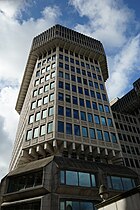
Back وزارة العدل (المملكة المتحدة) Arabic وزارت دادگستری بریتانیا Persian Ministère de la Justice (Royaume-Uni) French משרד המשפטים (הממלכה המאוחדת) HE Ministero della giustizia (Regno Unito) Italian 司法省 (イギリス) Japanese Justisministeriet (Storbritannia) NB Ministério da Justiça (Reino Unido) Portuguese Ministerul Justiției (Regatul Unit) Romanian Министерство юстиции Великобритании Russian
 | |
 102 Petty France, Westminster | |
| Ministerial Department overview | |
|---|---|
| Formed | 2007 |
| Preceding Ministerial Department | |
| Jurisdiction | Government of the United Kingdom |
| Headquarters | 102 Petty France Westminster, London |
| Employees | Over 77,000 |
| Annual budget | £6.3 billion & £600 million capital expenditure in 2018–19[1] |
| Secretary of State responsible |
|
| Ministerial Department executive | |
| Child agencies | |
| Website | gov |
| This article is part of a series on |
| Politics of the United Kingdom |
|---|
 |
|
|
| This article is part of the series: Courts of England and Wales |
| Law of England and Wales |
|---|
 |
The Ministry of Justice (MoJ) is a ministerial department of the Government of the United Kingdom. It is headed by the Secretary of State for Justice and Lord Chancellor (a combined position). Its stated priorities are to reduce re-offending and protect the public, to provide access to justice, to increase confidence in the justice system, and to uphold people's civil liberties.[2] The Secretary of State is the minister responsible to Parliament for the judiciary, the court system, prisons, and probation in England and Wales, with some additional UK-wide responsibilities, e.g., the UK Supreme Court and judicial appointments by the Crown. The department is also responsible for areas of constitutional policy not transferred in 2010 to the Deputy Prime Minister, human rights law, and information rights law across the UK.
The British Ministry of Justice may also oversee the administration of justice in Jersey, Guernsey, and the Isle of Man (which are Crown Dependencies), as well as Saint Helena, Ascension, Tristan da Cunha, and the Falkland Islands (which are British Overseas Territories).[3][4][5] Gibraltar, another British overseas territory, has its own Ministry of Justice.[6]
The ministry was formed in May 2007 when some functions of the Home Secretary were combined with the Department for Constitutional Affairs.[7] The latter had replaced the Lord Chancellor's Department in 2003.
The expenditure, administration, and policy of the Ministry of Justice are scrutinised by the Justice Select Committee.[8]
- ^ Budget 2018 (PDF). London: HM Treasury. 2018. pp. 23–24. Retrieved 30 July 2019.
- ^ List of Ministerial Responsibilities (PDF). London: Cabinet Office. 2010. p. 44.
- ^ "Crown Dependencies: Jersey, Guernsey and the Isle of Man". GOV.UK. Retrieved 17 July 2018.
- ^ "The Overseas Territories: Security, Success and Sustainability" (PDF). Foreign & Commonwealth Office. June 2012.
- ^ "Chief Justice of the Falkland Islands | Judicial Appointments Commission". www.judicialappointments.gov.uk. Archived from the original on 18 July 2018. Retrieved 17 July 2018.
- ^ "Departments & services | Government of Gibraltar". www.gibraltar.gov.gi. Retrieved 17 July 2018.
- ^ National Audit Office (6 July 2010). Ministry of Justice, Financial Management Report (PDF). TSO. p. 10. ISBN 978-0-10-296533-9.
- ^ "Role - Justice Committee". UK Parliament. Retrieved 28 August 2021.

